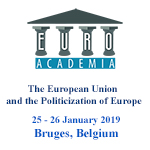Euroacademia Conferences
 Europe Inside-Out: Europe and Europeanness Exposed to Plural Observers (9th Edition) April 24 - 25, 2020
Europe Inside-Out: Europe and Europeanness Exposed to Plural Observers (9th Edition) April 24 - 25, 2020 Identities and Identifications: Politicized Uses of Collective Identities (9th Edition) June 12 - 13, 2020
Identities and Identifications: Politicized Uses of Collective Identities (9th Edition) June 12 - 13, 2020 8th Forum of Critical Studies: Asking Big Questions Again January 24 - 25, 2020
8th Forum of Critical Studies: Asking Big Questions Again January 24 - 25, 2020 Re-Inventing Eastern Europe (7th Edition) December 13 - 14, 2019
Re-Inventing Eastern Europe (7th Edition) December 13 - 14, 2019 The European Union and the Politicization of Europe (8th Edition) October 25 - 26, 2019
The European Union and the Politicization of Europe (8th Edition) October 25 - 26, 2019 Identities and Identifications: Politicized Uses of Collective Identities (8th Edition) June 28 - 29, 2019
Identities and Identifications: Politicized Uses of Collective Identities (8th Edition) June 28 - 29, 2019 The European Union and the Politicization of Europe (7th Edition) January 25 - 26, 2019
The European Union and the Politicization of Europe (7th Edition) January 25 - 26, 2019 7th Forum of Critical Studies: Asking Big Questions Again November 23 - 24, 2018
7th Forum of Critical Studies: Asking Big Questions Again November 23 - 24, 2018 Europe Inside-Out: Europe and Europeanness Exposed to Plural Observers (8th Edition) September 28 - 30, 2018
Europe Inside-Out: Europe and Europeanness Exposed to Plural Observers (8th Edition) September 28 - 30, 2018 Identities and Identifications: Politicized Uses of Collective Identities (7th Edition) June 14 - 15, 2018
Identities and Identifications: Politicized Uses of Collective Identities (7th Edition) June 14 - 15, 2018
The Media Reception of the Refugee Wave in the European Countries Outside the Schengen Area
-
-

-
Presentation speakers
- Gordana Tkalec, University North, Koprivnica, Croatia
- Iva Rosanda Žigo, University North, Koprivnica, Croatia
- Download presentation
Abstract:
The phenomenological research of the media reception of migrants is an interesting challenge in itself, especially when it is limited to the area that brings its own specificities. Relating to the not so distant experience of the war on its own territory with numbers of its own refuges and relatively short-term membership in the European Union (while still outside the Schengen borders), the media reception becomes a key to the creation of a media audiences’ attitude. The Croatian survey results regarding the various reporting methods on refugee problem and their influence on diverse perception of refugees, can help to understand the polarization of attitudes about the perhaps most problematic issue of the European Union; a question of inclusion and exclusion of immigrants into European society. The research was conducted over the most visited Internet pages on the Croatian speaking area, which provided information on immigrant issues and report. Particular attention was pursued on readers’ comments, but the essential goal was to examine various ways of media presentation on refugee issues. The research results indicate that objective, professional journalism can contribute to understanding the “refugee issue” in Europe, but unfortunately, it is a more common practice to target the media coverage polarization, which is then mapped to the attitudes of society as a whole.
-
Related Presentations













